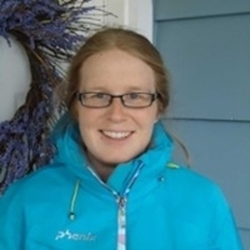
Nutrition on FYRE
Creating an undergraduate research opportunity using USask’s FYRE course concept has helped students in Dr. Jessica Lieffer’s Nutrition 230 course to develop excellent research skills.
By Brooke KleiboerDr. Jessica Lieffers (PhD) is an Assistant Professor in the College of Pharmacy & Nutrition. She leads the Nutrition Resource and Volunteer Centre and mentors undergraduate research students. She has been an integral part of a group of faculty and mentors who teach First Year Research Experience (FYRE) classes, aiming to offer a course-based research experience to undergraduate students. These courses are facilitated with the support of Dr. Merle Massie (PhD) and the Undergraduate Research Initiative, Office of the Vice President Research at the University of Saskatchewan.
Preparing students in the College of Pharmacy & Nutrition for professional practice in career dietetics is no easy feat, but Dr. Lieffers takes the challenge in stride. Her Nutrition 230 course is designed to do just that – students discuss a number of topics and issues they will encounter in their careers to facilitate professional development in the field.
Dr. Lieffers has been teaching Nutrition 230 as a FYRE course for the past three years. She is a long-standing champion of research opportunities for undergraduate students.
The First Year Research Experience (FYRE) program at the University of Saskatchewan was developed to provide students with opportunities to jump into the research process early. FYRE courses are structured as regular classes except that they offer research as a process of teaching and learning. These courses integrate the expertise of senior students who assist faculty members in delivering a mentored research experience. Students have a chance to experience the full research process while earning credit towards various USask degree programs.
“In our class, it is an opportunity to conduct original research from start to completion in one term,” Dr. Lieffers explains. “The [students] get to experience the full research process: how to formulate a research question, how to investigate it, and how to present their results to others. The class allows them to develop different types of skills that are important for professional development, such as oral and written communication skills, critical thinking skills, and creativity.”
The project in her Nutrition 230 course involves creating a unique research question that can be answered using data collected in a survey that is sent via PAWS and email to the wider campus community. Dr. Lieffers’ obtains research ethics board (REB) approval for the survey questions. The students learn proper data storage, conduct data analysis using Microsoft Excel, and work with their group to uncover findings. The final stage is a poster presentation of their full research projects, where other students and faculty from USask can view, discuss and critique their work.
Dr. Lieffers says that guiding students through their FYRE projects each year has positively impacted her own research activities. Dr. Lieffers is an active researcher and graduate student supervisor, and uses the course as an opportunity to learn from students. “Even just looking through all the student [research] questions and coaching them through developing their own survey questions has helped us develop better survey questions in our own research,” she says. “Some of the topics that students come up with are not within my own areas of expertise, so I learn through the FYRE process as well.”
In Fall Term 2020, amongst the challenges of remote learning and online environments, Dr. Lieffers collaborated with Kevin Read, an Associate Librarian in the Leslie & Irene Dube Health Sciences Library, to deliver the challenge of a FYRE class with the benefits of open science. Open science uses an ‘it takes a village’ approach to research. The Open Science Framework (OSF) aims to make research results from various studies and in various stages of the research process available to multiple disciplines. The framework stresses the importance of collaboration, transparency and accessibility in the generation of new knowledge.
“Open science is a relatively new concept that is not yet widely taught in academic programs, and if it is, it tends to be geared towards graduate students,” Mr. Read explains. “The FYRE project presented an opportunity to introduce students to open science at the beginning of their education about the research process.”
“The goal of my approach was to help students understand that making the research products that are created over the course of a project widely available - their research question, methodology, instruments, data documentation, and data analyses plan - can improve the accessibility, transparency, and reproducibility of their research,” Read added.
Although some instructors find integrating a full curriculum of content with a research-based learning opportunity challenging, Dr. Lieffers enjoys seeing the students’ finished products. NUTR 230 students often find passion and excitement in the self-directed project format. “Working with the Open Science Framework as well as having a virtual poster showcase and the ability to respond to others’ comments furthered my feelings that my research was legitimate and not just another class project,” a NUTR 230 student said. “This greatly increased my confidence to be able to do my own research in the future."
“I get excited about our FYRE class every year,” Dr. Lieffers says. “Some of the questions students have come up with have been absolutely amazing. The highlight of the term for me is our poster show.”
Faculty leadership is imperative to implementing research experiences in undergraduate courses, and Dr. Lieffers has been integral to introducing research to Nutrition students. Igniting a passion for research in students supports professional and academic skill development. Learning how to generate new knowledge, interpret it and share it with the world is what university is all about.
“Don’t be afraid to ask questions if research is new to you,” she emphasizes. “I would encourage anyone interested in undergraduate research to sign up for a FYRE class if you can.”

